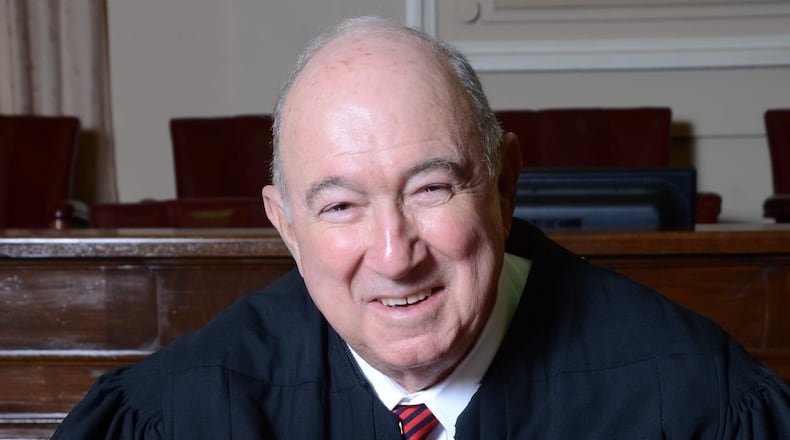MACON — Senior U.S. District Judge Hugh Lawson Jr., a folksy yet firm, direct and revered legal figure in these parts, who went from serving as a public defender in the Middle Georgia river country where he was born all the way to the federal bench, has died. He was 82.
His death, on Good Friday, came about six weeks after he suffered renal failure, his wife, Barbara Lawson, said.
His funeral was Tuesday in Pulaski County. On the door to his chambers at the federal courthouse in Macon, a placard placed there Monday bore a quote from the Bible: “Know ye not that there is a prince and a great man fallen this day ...?”
Known for his adroit courtroom manner and colorful way with words, Lawson unleashed a fusillade of the latter in his obituary, a feisty epilogue he penned himself.
He was not the sort to leave the last word on his life to, as he put it, some “funeral home hacks.” He also noted that anyone who “wrote that his memory would be ‘forever treasured’ should be shot.”
(For the record, no one quoted herein employed that trite phraseology. However, when prompted, a friend who happens to be an associate justice of the Supreme Court of Georgia dared to venture perilously close.)
Lawson was formerly a superior court judge in the Oconee Judicial Circuit southeast of Macon. More recently, from 2006 until 2008, he served as chief U.S. District Court judge for the sprawling, 70-county Middle District of Georgia.
In the late 1980s, before his 1995 appointment to the federal bench, he notably presided in retrials for a band of men accused in the 1973 deaths of six members of the Alday family in southwest Georgia. When the notorious slayings in Seminole County happened, they were said by then-Gov. Jimmy Carter to be “the most heinous crime in Georgia history.”
Lawson’s self-written obituary does not mention his role in the Alday murder case — or, for that matter, any trials he had a hand in. But it was in Lawson’s courtroom, in Houston County in 1988, that ringleader Carl Isaacs was sentenced to death in the killings.
“Isaacs was impassive as he heard the death sentence, pronounced six times for the execution-style murders of Ned, Aubrey, Jerry, Chester, Jimmy and Mary Alday,” The Journal-Constitution reported. “Relatives seated in the courtroom, including Ned Alday’s 74-year-old widow, Ernestine, wept and hugged each other.”
He presided over pretrial hearings in the early stages of a case against Nuwaubian sect leader Dwight York, also known as Malachi York, who in 2004 was sentenced to 135 years in prison in the widest-ranging federal child molestation case in history. Before recusing himself, Lawson pushed back at a plea agreement that would have kept York behind bars for 15 years, describing the sentence as too lenient.
Lawson also heard his share of civil cases. In 1998, he ordered chemical behemoth DuPont, which allegedly withheld evidence in a civil case five years earlier, to pay $2.5 million each to four Georgia law schools to endow department chairs, dishing out a lesson on the importance of legal ethics. A DuPont attorney at the time told the Associated Press, “This is a constructive, creative resolution Judge Lawson has put together.”
On Monday, Judge Marc T. Treadwell, now chief of the Middle District, said Lawson was cut from the same cloth as the renowned late Judge William Augustus Bootle, for whom the federal courthouse in Macon is named.
“He was truly the rock of this court,” Treadwell said of Lawson.
“He was without a doubt the most well-read person that I know with regard to history and local history, and I think that shaped his thinking.”
Lawson had been a federal judge for about a decade and a half when Treadwell joined the court. They frequently had lunch together. Early in Treadwell’s tenure, Lawson told him, “Marc, you will find that people will have many fine things to say about you. You will be just fine as long as you don’t believe a word of it.”
‘Just a country boy’
In 1995, when he became President Bill Clinton’s nominee for a federal judgeship after serving 19 years as a state judge in the Oconee Circuit, a local newspaper write-up described Lawson as “a large, slow-talking man.”
Roger Hugh Lawson Jr. was raised in Hawkinsville. His mother, a Duke University graduate born in Claxton, was a skilled pianist who, for a time, was an elementary school teacher.
In 1983, twin bridges that spanned the Ocmulgee River in Hawkinsville were named for his late father, attorney Roger Lawson, a former FBI agent and State Highway Board chairman who mounted a brief campaign for governor in 1958.
Seven years after the junior Lawson became a superior court judge, a 1986 profile of him appeared in the Macon Telegraph and News. The article described him as “the big man with the booming voice,” a fellow easy to laugh who also played “a mean harmonica.”
Of the instrument, he said, “Everybody gets tired of hearing it but me.”
Lawson graduated from Emory University School of Law in 1964 and went to work at his father’s hometown firm, which his grandfather founded at the turn of the century.
“With country lawyers … you have to be prepared to handle whatever comes through the door,” Lawson told the Telegraph and News in 1986. “There would be days when I would devoutly wish I could specialize. Then on other days, I thought if I had to (specialize), I would go crazy.”
In his self-authored obituary, written in third person, Lawson recalled that he and his father “worked hard, were unusually successful, abused tobacco and (if they felt the occasion warranted) drank a good deal of whiskey. All in all, it was a great life.”
He and wife built a log cabin by hand. “My laughing place,” he called the retreat, which was situated by a fishing pond on his father’s estate.
In his obituary, the final draft of which he completed in 2018, Lawson wrote that he “was fond of quoting his father’s observation that there are only two things a man needs to know to keep women happy, but no one knows what they are.”
Speaking of her late husband, Barbara Lawson said, “He was quite a writer, wasn’t he? … He got right to the point.”
In 2000, while he was at work inside the federal courthouse in Columbus, Lawson’s 1995 Buick Park Avenue was stolen. It turned up a couple of days later. A police report at the time mentioned Lawson had left the car unlocked with its key in the ignition.
“He did not fear that sort of thing,” his wife said of the episode. “He was just a country boy used to going where he wanted.”
Contributed
Contributed
‘God is my lawyer’
Peter D. Leary, U.S. Attorney for the Middle District of Georgia, was once a clerk for Lawson.
Leary said the judge’s mentorship guided countless lawyers in the state and that his knack for turning phrases was unmatched.
“He was the best public speaker I’ve ever heard,” Leary said.
When Leary argued his first case, the presiding judge was Lawson.
During jury selection, Leary’s courtroom articulation was, in Lawson’s estimation, less than polished. Afterward, Lawson summoned the young Leary to his chambers. The judge, his tone bordering on not-so-distant thunder, said, “Peter, you’re saying ‘um’ too much. It’s damn annoying. Stop!”
Timothy G. Vaughn, the longtime district attorney of the six-county Oconee Circuit, which stretches east from Hawkinsville to near Vidalia, clerked for Lawson when Lawson was a state judge.
“He didn’t take himself too seriously. He gave the job the reverence and seriousness that it was supposed to have,” Vaughn said. “But you might see him riding around in a white T-shirt and his overalls in his old red Dodge pickup truck with his three Labs on back.”
Vaughn recalled a long-ago civil dispute involving the shooting death of someone’s prized hunting dog. Lawson was the judge. It seemed the dog had chased a wounded deer onto someone else’s property. The owner of the property shot and killed the dog.
Lawson awarded the dog’s owner a modest sum as compensation, and in his ruling declared “one man’s $1,000 deer dog is another man’s yard dog.”
During another proceeding, in Telfair County, a criminally accused man showed up in court alone, Vaughn said. Lawson asked the man who was representing him.
“God is my lawyer,” the man replied.
“Well,” Lawson asked, “do you have an earthly attorney?”
Verda M. Colvin, an associate justice of the Supreme Court of Georgia, was once an assistant U.S. attorney in Lawson’s home district. She recalled him as hard but fair and occasionally gruff.
“But he was still lovable,” she said. “I think the world of him.”
Told of Lawson’s disdain for hollow platitudes and flowery cliches in obituaries, Colvin was also informed of his most abhorred obit terminology. That someone, on his account, might deem his memory “forever treasured.”
Colvin was asked to choose, perhaps, a more fitting sendoff. She played along and declared Lawson’s memory would be “forever emblazoned in my mind.”
No gunplay ensued.
About the Author





